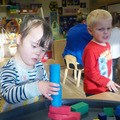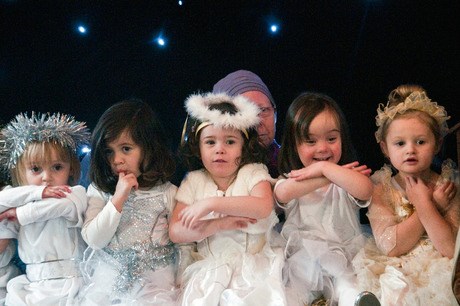A Unique Child: Inclusion - Supporting... Abigail and Isobel
Ruth Thomson
Monday, April 20, 2015
One setting's inclusive approach to caring for twins with Down syndrome has benefited both the girls and their peers. Marianne Sargent reports

Since entering the baby room at nine months old, twins Abigail and Isobel Parry, who have Down syndrome, have been growing and developing alongside their mainstream peers. Their setting is Playdays Daycare Nursery, Bolton, and their teacher, Natalie Hope, believes their inclusion in mainstream early years education has had a significant effect on their development and led to their becoming confident and outgoing individuals.
'From a social aspect the girls are definitely happy being here,' says Ms Hope. 'I think it's definitely helped them to be confident without each other. They enjoy each other's company but they have their own friends. When they are in the pre-school room they don't follow each other around; they are off doing their own thing.'
However, it is not just Abigail and Isobel who have benefited. Many of the children in the pre-school room have been with the twins since they were babies and Ms Hope highlights the positive impact this has had.
'The girls like playing in the home corner and all the other children just see them like any other child and play with them. One of our eldest girls is really caring towards them and behaves like an older sister. She really understands them and Abigail and Isobel respond to her as well.'
IDENTICAL BUT INDIVIDUAL
 All children with Down syndrome will have some form of learning difficulty. However, these additional needs vary between children and this includes identical twins. To ensure their needs are met, the staff at Playdays agreed Abigail and Isobel should have different key workers.
All children with Down syndrome will have some form of learning difficulty. However, these additional needs vary between children and this includes identical twins. To ensure their needs are met, the staff at Playdays agreed Abigail and Isobel should have different key workers.
'Yes they are twin sisters, but we decided we should concentrate on the girls separately,' says Ms Hope. 'It's something that works for the parents as well. Like all other children, they have individual learning journeys that track their development, but they also have individual education plans that set out targets and strategies to meet their specific needs.'
The setting has received funding only for Isobel despite both girls having additional needs. A pre-school support worker visits the setting five hours a week and focuses on Isobel's targets. However, Abigail has needs of her own and it has just been determined that she requires a hearing aid for focused activities to help her concentrate better.
'One of the biggest challenges has been the local authority,' says Ms Hope. 'As the girls live in Chorley they come under the jurisdiction of Lancashire. However, we come under Bolton so issues such as funding have been a struggle for us.'
 Despite this lack of support, Ms Hope is extremely positive about Abigail and Isobel's inclusion within a mainstream setting. 'They've just kind of slipped in and done really well,' she says. 'Luckily, we've got a special educational needs co-ordinator (SENCO) in each room so when they were in the toddler room the SENCO spent time with them in there and when they moved up to the pre-school room the transition was effective and allowed us to really focus on their specific needs. I feel this is much better than having one SENCO for the whole setting.
Despite this lack of support, Ms Hope is extremely positive about Abigail and Isobel's inclusion within a mainstream setting. 'They've just kind of slipped in and done really well,' she says. 'Luckily, we've got a special educational needs co-ordinator (SENCO) in each room so when they were in the toddler room the SENCO spent time with them in there and when they moved up to the pre-school room the transition was effective and allowed us to really focus on their specific needs. I feel this is much better than having one SENCO for the whole setting.
'Sometimes we would like to spend a bit more time with them, but that's where the pre-school support worker comes in.'
GOOD COMMUNICATION
Abigail and Isobel's parents, Jodi and Matt Parry, have been using Signalong with them from the earliest opportunity. This is a sign supporting system based on British sign language, designed for people with communication difficulties. It made sense that the staff at Playdays should be trained to do use the same system. This has also been extended to the other children in the setting.
'We have been teaching the children lots of signs and how to sign nursery rhymes,' says Ms Hope. 'They absolutely love it. A lot of the children interact with the girls in this way. This improves communication between all the children and as a result the children involve the twins in all their activities.'
Before the twins were able to use and understand signs, the nursery staff used visual cues in the form of a visual timetable and photo books. However, being able to communicate through sign language has had a tremendous impact on their learning.
'Us learning the sign language has definitely helped them,' says Ms Hope. 'The girls join in with most mainstream activities. They know all their numbers, their colours, what you're saying to them. Even though they can't communicate verbally, they can do it through signs and they have good concentration. I think that definitely helps.'
TWINCESS
When Abigail and Isobel were born, their parents set up a charity called Twincess to raise awareness and offer support to other families of children with Down syndrome. Playdays has supported the cause with fundraising days, on World Down Syndrome Day for example, and a Christmas raffle.
Mr and Mrs Parry's charitable work has helped them gain a good understanding of the condition and this has been of great benefit to the practitioners who work with the twins.
'We work closely with their parents,' explains Ms Hope. 'Information passes back and forth. They'll let us know if there's anything they know about their development and we'll do the same.
'If the girls are using sign language here that we don't know, we can ask mum or dad and they will let us know what it means. We work really well with them. They wanted their girls in mainstream school and to be included. Hopefully we've achieved that.'
DOWN SYNDROME FACTS
- Down syndrome is caused by the presence of an extra chromosome 21 in the body's cells. It is not a disease and is not hereditary, but a genetic condition that occurs by chance at conception.
- Although every one in 1,000 babies in the UK is born with Down syndrome, the odds of having identical twins with the condition are about two million to one.
- Like any other children, those with Down syndrome will develop at different rates and have varying interests, aptitudes, needs and abilities. With early intervention and targeted support there is no reason why they should not progress in all areas of learning and development.
- Many children with Down syndrome can expect to attend a mainstream educational setting.
- Nowadays, the life expectancy of someone with Down syndrome is between 50 and 60 years.
NATIVITY PLAY

Parents of Abigail and Isobel, Jodi and Matt Parry, approached the girls' first nursery nativity play with apprehension, but it was proof of their complete acceptance within the 'life' of the setting.
In his blog, Matt wrote: 'In the children marched, beaming smiles, waves to mummy and daddy. I then saw a little angel appear, MY ANGEL.
'Full of pride, she marched in and took her place on the bench and smiled from ear to ear. About ten children behind her was a little star, MY STAR.
'Due to Abigail's hearing problems, the nursery had promoted signing throughout their class in everyday life. To see 50+ children following the lead of nursery teacher Natalie signing the songs was so incredibly moving.
'All we ever wanted was inclusion and this was the biggest gesture we have ever witnessed. Our girls have been accepted as "one of the children": no different; not left out; simply one of the children. The children at the girls' nursery know no different and that is all down to the staff and their philosophies and model. Sending them to a mainstream nursery is one of the best decisions we have ever made and we can't thank the staff enough.
'I am convinced that there can be a better future for people with Down syndrome. Forty-eight of society's youngest people who just happen to be in the girls' class have accepted them as friends, shown them no pity.
'We received some heart-warming messages from parents who were in the audience. So many commented on how the girls had captivated them as much as their own children and how they were proud that their children had grown up with our girls. Messages like these really humble me. The girls take so much in their stride and are having such an impact on other people's lives that I am so incredibly proud of them, more than they will ever know.'
MORE INFORMATION
The Down's Syndrome Association has produced an education support pack to help mainstream settings, www.downs-syndrome.org.uk/for-new-parents/education/education-support-packs
Down's Syndrome Scotland has produced an information booklet for early years practitioners, http://downsyndrome development.org.uk/wp-content/uploads/2013/03/Including_pupils_Early_Years.pdf
Including Children with Down's Syndrome in the Foundation Stage by Claire Beswick
Signalong, www.signalong.org.uk
Twincess, http://twincess.co.uk.




